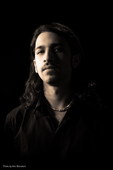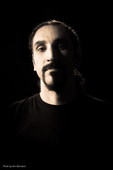Orphaned Land
People Need To Learn to Respect
06.07.2013
Архив интервью | Русская версияWhen people say that there’s hardly any originality left in heavy metal, it always surprises me as there are so many unique bands around. Look no further than Orphaned Land, Israel’s flagship metallers, who have just released their sixth full-length album, “All Is One”. The band makes very good use of their home country’s musical heritage, yet it’s hard to call them folk metal; they employ complex arrangements, yet the record is very accessible and can hardly be classified as progressive metal; they mostly stick to slow and mid tempos, yet you must be crazy to call them pure doom or gothic metal. Add to this a unique and outstanding concept – for most of their career the Israeli band has been advocating friendship between the belligerent parties in the Middle East, which brought them a lot of respect, as well as some hatred (an Egyptian fan has even been put to prison for keeping an Orphaned Land CD at home). We got to talk with the band’s guitarist Chen Balbus, the youngest and the newest member of Orphaned Land, yet, as you can see below, he is as much engaged in the cause for which the Israelis has been working for 20 plus years as the rest of the band. Read on to hear the stuff which you don’t regularly hear from a metal musician…
“All Is One” is the first Orphaned Land with you on the guitar. How did you get to know the band and join them?
There is always the funny story that I was born when Orphaned Land was formed. The guys have known me since I was born, they were all good friends with my brother, forming together the band Resurrection, which is Orphaned Land today. I was always enchanted by the music the guys were making and I kept uploading videos of me playing their songs. After a while Yossi (Sassi, guitar) contacted me and asked me if I wanted to be their guitar replacement. For me that was an amazing moment getting a chance to play with my favorite band. After that we did a few shows together when I was replacing Yossi and Matti (Svatizky, guitar) and playing with them on bouzouki in Israel. When Matti departed from the band, the guys already felt that I'm a part of the band, so I naturally took Matti's position.
When a new person joins Orphaned Land, does he have to share the views/beliefs of the rest of the band? In other words, is music the only bond between the band members or do you also have the same ideals and goals?
Being in a band is like a marriage. You have to be with those guys in the happiest and hardest moments of your life. We are all different in a way and we have our similarities that bond us together. We are all motivated by the same goal to keep making our music that we like, and succeed with the power of music. The band is like a family, and we learn how to live and work together in the best way to keep the band running.
Singer Kobi Farhi has said in an interview that “All Is One” came out so quickly (only 3 years after “The Never Ending Way of ORwarriOR”, not 6 years like “ORwarriOR” after “Mabool”) thanks to your influence. How do you personally evaluate your impact on the new album and on the band in general? How much do you contribute as a songwriter?
They already had a few compositions that they wrote a while before Yossi went on his tour and Matti departed from the band. Kobi and Uri (Zelcha, bass) came to me with the material, and the three of us together 100% were committed to this album, working on the songs day and night. I brought all my musical knowledge from my generation that has grown with computers and all the technology, so I knew how to work more efficiently when making the arrangements for the songs and pre-producing the whole album, recording guitars at my studio, programming drums, keyboards and so on. Along with my own compositions and artists that wrote for us, the three of us built this whole album within 2-3 months of intensive work. We had 15 versions of each song and 150 mails for each one until it was finally ready.
The new album is more straightforward in song structures, at the same time, it is more elaborate in arrangements, as you engaged more than 40 people in the recording process. Are these changes intentional? Do you aim to reach a broader audience this time?
The fact that “All Is One” is a more straightforward album gave us the opportunity to experience working with something that is new to us, doing much in less. Finding exactly what parts fit where and how, playing in a certain way that contributes the song and not just showing off technical skills in playing and composing. We manage to keep the Orphaned Land trademark as we compose pure oriental metal music in any kind of way. On “All Is One” the aim was to be easier to listen and straightforward to the listener. And that's why this album turned to be the strongest album we have ever released.
Why did you decide to record most of the album in Sweden, not in Israel, as the band did with “The Never Ending Way of ORwarriOR”? How do you evaluate the contribution of producer and mixing engineer Jens Bogren to the recording process?
After getting to know more the work of Jens Bogren with our DVD “The Road To Or-Shalem”, we knew that he could provide us that new clear and modern sound we wanted. The plan was to record as much as we can in Sweden, the best studio for metal music, but it was not possible to take all of the 40 musicians with us to record in Sweden. In Turkey we recorded eight string players in a studio that specializes in orchestra recording, in Israel we recorded most of the guests and the 20-person choir. I think that the combination of us and Jens helped this album be the best oriental metal album there is. With his mixing expertise and our own way to produce our music, it became a perfect album.
What was the most memorable moment in the recording process for you personally? E.g. for “Mabool” Kobi secretly recorded a bit of his singing in Taj Mahal – did anything like that happen this time?
I remember when I just finished laying all the guitar solos for the album, we found this xylophone\glockenspiel in the studio and as music explorers, we thought how we could combine it in one or two songs. Eventually I found myself awake at 5-6 a.m. recording a glockenspiel for the album when Kobi and Uri were bursting with ideas what we could do with it on the other side of the window. On this album there are no secret recordings that we used other than the beginning of 'Ya Benaye' which is actually the original track (cover of Aharon Amram).
Apart from guitar, you play piano, bouzouki and xylophone on the album. How many instruments do you play in total? Which is your favorite one (apart from guitar, of course)? Which was the most difficult to learn?
Apart from guitar I have always had the passion for stringed instruments, especially the Middle Eastern ones like you mentioned such as bouzouki, baglama, oud and more. I play about 10 instruments. I would say that playing the flute was the most difficult for me to learn since I'm usually short out of air. I think that if I wasn't a guitar player, I would be a pianist, since that was the first instrument I ever learned how to play on.
Your style is characterized for “playing the guitar as if it was an ethnic instrument” (a quote from the PRS Guitars website). How did you develop this unique style? Who/what influenced your guitar playing?
I usually listen to a lot of Middle Eastern music, trying to find out how people approach playing, for example, the bouzouki, saz or oud, and I just try to apply it to a full blown electric guitar. I think that's the right approach in order to sound unique and not like just another guitar player, everyone has to have their own thing. Before I was a part of the band I remember when Kobi always said how they combine those instruments together, the East and the West together - that really got into my mind and made me want to sound unique and use unusual tunings and style of playing the guitar.
A year ago it was announced that Orphaned Land had applied for Turkish citizenship. Have you succeeded in getting the citizenship? What goals did you pursue with applying for it?
We still don't have any confirmation on the subject due to the political situations between the countries and within the countries that are going through a crisis. We made this move because Turkey is our second home that is the only Arab country that we're allowed to enter. We applied for citizenship as a tribute to the Turkish people that support us endlessly and also because it could help us enter other Arab countries that we're not allowed to enter with an Israeli passport and play for our fans.
In Turkey, the band has received the “Friendship And Peace Award”, which means recognition on the level of the society and the authorities. What is your status in Israel? Do the authorities recognize the band as an influence on the public opinion? How many people typically attend an Orphaned Land concert in Israel? Are your songs played on TV/radio?
As time goes, Orphaned Land are becoming more known around the globe and we have always been the biggest band to come out of Israel. Usually we have full support for our music motives and ideas to strive for peace. We sometimes even get financial support from the government to promote our shows and fly abroad with the idea of peace. Our shows are almost always sold out and full of happy people that love Orphaned Land. We are starting to be played on the radio more and more now after the release of “All Is One” and the big impact it has made. Still it’s not easy to go on due to the fact that our music is not mainstream.
What is your opinion of the “Arab Spring”, i.e. the recent wave of revolutions in the Arab nations of the Middle East? Do you think this will help ease tensions in the region, or on the contrary, does it only fuel the confrontations?
I don't know much about it, to tell you the truth. I know there's a lot of tension going on there. People are finally seeing that there is a better way to live with democracy and not be ruled and forced down by a dictator. I think it is good that people are finally rising up, although I'm sad to see that how it works and it has to go through wars and bloodsheds just because of the will to live free in this world.
I understand that this is a very complicated matter and many people are struggling to find answers, but can you name a few measures that, in your opinion, should the peoples and/or authorities take to bring back peace to your homeland or at least calm down the fighting parties a bit?
I believe that the answers how to reach the global peace are quite obvious, unfortunately it's not that easy to do. To change the world you have to start with the small things, “Rome wasn't built in a day”, as they say. People need to learn to respect one another no matter from where a person is, what his beliefs are, what color his skin is, etc. People should be judged by the heart. When that happens and our media and politicians don’t promote blood and wars, we will be on the right path to a true change. I hope that “All Is One” will spread and people will see and understand what we are trying to tell the world.
In some cases, when a band from one country becomes famous abroad, others follow (e.g. it happened in Italy with Rhapsody of Fire’s breakthrough), in other cases, this band remains the only one from that country that the public abroad knows (e.g. Moonspell have been the only metal band Portugal is known for since 1995). In your opinion, what scenario will the Israeli metal scene follow? Are there any Israeli metal bands that have the potential to make it big in the rest of the world any time soon?
There are already many metal bands here on the Israeli metal scene that have found a way to break through and go outside of Israel. I think that a lot of that is thanks to the technology we have today that enables us to share our music within seconds and people all over the world to hear it. That truly changed the whole business and made it easier to just form a band. You can even record your music at home and it will sound not far from high quality studios, you can send it out wherever you can and go touring around the globe. I know about the band Hammercult who won the Wacken Metal Battle and since then they are growing bigger and bigger.
Orphaned Land can be viewed as emissaries of the Middle Eastern music and culture for the rest of the world. When you play, for instance, in South America, do people come to your shows just for good music, or do they also want to learn something about your culture and your message? Do you consider it as one of your goals to spread the word of the situation in the Middle East across the planet?
Apart from just sharing our music everywhere, we want people to understand the importance of the message behind it. One of the best comments I heard on 'All Is One' is as follows, “This album is the one you don't listen with your ears, you listen to it with your heart”. Music is a language that we can all share no matter where we are from and who we are. It is the strongest power in the world that can unite people and with that we seek to show the world that we can all get along as brothers and stop those wars, not just in the Middle East Wherever there is any sort of behavior that doesn't support world peace - we wish to show that there is a better way.
With the new album being the band’s most bombastic album so far, what are you going to do with these big arrangements when you play live? Are you going to use backing tracks for choir and string parts, or will you strip down the arrangements?
Since those arrangements really tie the album together and make it as grand as it is, we will have to use backing tracks since we are not able to bring all those musicians with us. It's quite common even with bigger bands such as Turisas, Nightwish, etc. Of course there will be special shows from time to time where we might make new interesting arrangements for the songs.
I’ve always wondered who comes up with ideas and costumes for the band’s promotional photos. Do you work with a stylist or designer, or do the band members come up with all those very stylish and sometimes controversial outfits themselves?
Usually it's Kobi and Uri who has the visual ideas of how things should look, they just throw them at us and we decide together as a band what eventually fits the concept of the album and the band. We sometimes have some help with friends, co-producers who help us along with the more technical issues on how our ideas can be put together on the picture.
Some years ago you had a solo project which you put on hold when you joined Orphaned Land. Do you have any plans to continue it? What kind of music would you like to play outside Orphaned Land?
Maybe one day I will do something with it, but I prefer to focus on the Orphaned Land now and give my 110% only to the band. I constantly compose music, no matter if it will fit in Orphaned Land or it won't. It's always in the "music drawer". (smiles) Outside Orphaned Land I'm usually into softer music such as rock Middle Eastern music, even pop, oldies. I like to combine many music genres together.
Orphaned Land have not played in Russia since 2007. Do you have any plans to come back to Russia any time soon?
Hopefully we will be back next year for a tour following the impact of “All Is One” that I hope that will do wonders in Russia. We are always looking forward to play anywhere we have fans that want us to play for them.
Orphaned Land on the Internet: http://www.orphaned-land.com
Special thanks to Niklas Tschaikowsky (Century Media Records) for arranging this interview
Roman Patrashov
July 4, 2013
© HeadBanger.ru







